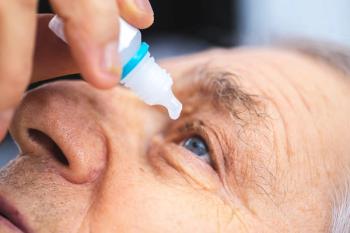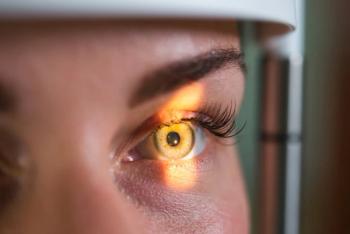
- June digital edition 2024
- Volume 16
- Issue 06
Plenty to be proud of: Positive reminders of what it means to be an OD
Reflecting on big optometric wins keeps eye care in perspective.
Although the world often seems fixated on negativity, and optometry is certainly not immune to that trend, there are many things to celebrate in the profession. An example of this stems from an interesting conversation I had with Tom Griffith, OD, at the 2023 Southeastern Educational Congress of Optometry (SECO) conference in Atlanta, Georgia. He is one of our profession’s true champions, having practiced and served organized optometry for several decades in West Virginia. Tom had been speaking with a fellow optometrist at SECO, and she relayed to him how upbeat the meeting was and that as she sat in class there, it was the first instance in quite some time where she encountered colleagues who were truly excited about the profession. I guess that’s good and bad at the same time. I don’t know what other meetings she may have attended, but I was reminded how contagious our attitudes can be, as I reflected back on the privilege it is to practice optometry and some of the specific moments that inspired this sense of pride.
The optometric journey: admission, graduation, and practice
Like some of you, I came to optometry from a previous career, which gave me a different perspective than I had right after undergraduate school. I was looking for an opportunity to be my own boss while making a tangible difference in the lives of others, all while enjoying a high quality of life and making a decent livelihood for my family. Although that last point is a little more challenging than it used to be, there’s no doubt that optometry still checks all those boxes. Applying to optometry school was challenging, as there were just over 1000 applicants for the 120 seats I applied for at the Southern College of Optometry in Memphis, Tennessee, but I somehow managed to get in. That made me proud, but it was also intimidating as I now faced a new city in which I knew no one, a new school, the task of having to make new friends, and the unknown of whether I could successfully make it through professional school. By the grace of God, I persevered through optics, anatomy, pharmacology, anterior and posterior segment disease, labs, theory and methods, clinical rotations, externs, national boards, and all our other educational requirements, eventually graduating and getting licensed. That made me proud, too. After finishing a residency at the Memphis Veterans Affairs Medical Center, starting practice at West Tennessee Eye, and then eventually moving home to join the Bond-Wroten Eye Clinic, I had officially become part of the profession of optometry and was proud to be an OD.
Good Morning America
I have never been a regular viewer of the iconic morning show, Good Morning America, but I vividly remember turning it on by chance one morning in 2006. As fate would have it, a health alert was the first story that came on, highlighting an outbreak of fungal keratitis in contact lens wearers, which obviously got my attention. I stopped getting ready for work and tuned-in to see news anchor Charlie Gibson interview our late colleague, Art Epstein, OD, who was then the chair of the American Optometric Association’s (AOA’s) cornea and contact lens section.1 I was elated to watch Art lead the national conversation on the issue on network television. My back straightened and I couldn’t help but smile. I was proud to be an OD.
Scope expansion
In 2014, Louisiana became the third state (following Oklahoma and Kentucky) to pass legislation authorizing optometrists to perform ophthalmic laser surgery.2 This came after a stalled attempt the prior year and was no small feat in the face of especially heated attacks and false accusations by organized medicine. William Reynolds, OD, past president of the AOA, and one of the principals involved in passing Kentucky’s legislation, stated that, in his opinion, Louisiana’s success was the single most important victory for optometry since the AOA successfully advocated for optometry’s inclusion in Medicare in the mid-1980s. His reasoning was that Oklahoma had led the way by initially doing lasers via National Board of Examiners in Optometry rule before eventually putting it in statute a decade later, and that his own state of Kentucky had successfully orchestrated a surprise laser bill, but Louisiana had to directly battle organized medicine for more than a year and still prevailed, showing other states that it could be done. It was extremely gratifying to have played a small part in that battle, alongside Jim Sandefur, OD, executive director emeritus of the Optometry Association of Louisiana (OAL); Senator David Heitmeier, OD (D, Louisiana); Jerry Gerdes, OD, former OAL president; and Mark Roy III, OD, OAL legislative chair, as well as many other amazing colleagues. I was proud to be an OD.
The great flood
In 2016, our southeast Louisiana community was deluged with more than 30 inches of rain in a 36-hour period, after weeks of showers prior to that had already saturated the ground and caused area rivers to swell. My home, and the homes of 2 of our other doctors, our practice administrator, and numerous staff members, as well as 1 of our clinics, flooded with several feet of water. Fortunately, our families were safe, but it was an overwhelming mess for many months, while facing numerous unknowns. We leaned heavily on our faith, our family, and our friends to persevere, and one of the most encouraging things of all was when my classmates and colleagues from across the country offered their encouragement and assistance. Nearly 30 of my Louisiana colleagues showed up at our home one Saturday to help with cleaning and demolition. I was overwhelmed by the generosity and outpouring of support from my optometric family. I was both humbled and proud to be an OD.
COVID-19
In some ways, it’s hard to believe we’re now 4 years removed from the first wave of COVID-19 in the United States, but thinking back to that masked-up, socially distanced time, I’m still inspired by optometry’s response. Eye care providers across the country stayed on the front lines as essential health care workers, providing emergency eye and vision care services despite the fears and uncertainty that persisted at the time. The AOA and its board, staff, and volunteers successfully advocated for optometry’s inclusion in government aid programs, which we were initially excluded from, and then stepped up to offer no-cost webinars available to both member and nonmember optometrists to help them successfully navigate those programs, led so ably by Jeff Michaels, OD.3 Instruction on how to appropriately code and bill for telehealth visits were also provided by Rebecca Wartman, OD, as well as sharing of best practices and tips for safely seeing patients in that challenging, unprecedented environment. There was not another professional association—health care or otherwise—that did a better job guiding its members and nonmembers through COVID than the AOA did. I was proud to be an OD.
So what?
Trust me, my head is not in the sand. I know the challenges we face, but I’m neither an eternal optimist nor a perpetual pessimist, instead preferring a quote from Louis Zamperini, a young track star in the late 1930s who, after enlisting in the US Army Air Forces during World War II, survived a plane crash at sea only to be captured as a prisoner of war. In his book, Don’t Give Up, Don’t Give In: Lessons from an Extraordinary Life, he states, “People tell me, ‘You’re such an optimist.’ Am I an optimist? An optimist says the glass is half full. A pessimist says the glass is half empty. A survivalist is practical; he says, ‘Call it what you want, but just fill the glass.’ I believe in filling the glass.”4
Our attitudes and perspectives about our profession do matter. Patients and staff can tell when we enjoy and appreciate what we do versus when we don’t. They will return to see doctors who do the former, while avoiding those who do the latter. In essence, taking a moment to reflect on why we do what we do, remembering what drew us to optometry, and focusing on the opportunities our profession affords us rather than just the challenges we face, is actually a practice builder—not to mention that it’s therapeutic for our personal health and well-being. Each day, we have the privilege of helping others see, preserving their sight, increasing their quality of life, relieving pain and treating ocular diseases and injuries, helping diagnose and manage systemic diseases, and even occasionally saving lives. Our quality of life is high compared with many other health care providers, and although we do have our challenges, like every health care profession does, we’ve always been able to fill the glass. I’m confident we’ll do it again, which is why I’m still proud to be an OD.
References:
Dr. Art Epstein interview on Good Morning America about the B&L ReNu fusarium keratitis outbreak. YouTube. September 23, 2010. Accessed May 22, 2024.
https://www.youtube.com/watch?v=pmyKKFmRuJU&t=1s Lane E. Bill approved by Louisiana legislature lets optometrists perform some eye surgeries. Nola. May 22, 2014. Accessed May 22, 2024.
https://www.nola.com/news/politics/bill-approved-by-louisiana-legislature-lets-optometrists-perform-some-eye-surgeries/article_4c8a1cf1-8afe-5172-b342-cded6b4bd4f2.html Congress’ COVID-10 relief package: HHS funds, ERC extension and more. American Optometric Association. March 11, 2021. Accessed May 22, 2024.
https://www.aoa.org/news/advocacy/federal-advocacy/congress-covid-19-relief-package-hhs-funds-erc-extension?sso=y Rensin D, Zamperini L. Don’t Give Up, Don’t Given In: Lessons from an Extraordinary Life. Dey Street Books. 2014.
Articles in this issue
over 1 year ago
Elevating optometric keratoconus managementover 1 year ago
Selecting a visual field analyzer for the futureover 1 year ago
One month, 2 great meetings: An IKA and CIME recapover 1 year ago
To retina and beyond: What lies beneathover 1 year ago
Tear evaporation plays role in dry eye diseaseover 1 year ago
Utilizing the immune system to combat dry eye diseaseover 1 year ago
Is race relevant to the case?Newsletter
Want more insights like this? Subscribe to Optometry Times and get clinical pearls and practice tips delivered straight to your inbox.








































